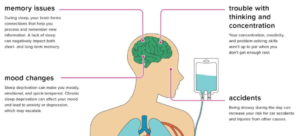In previous posts, we have discovered two of the main reasons why we, as humans, forget. But one of the most basic functions we go through in our daily lives is the ability to sleep or to recharge at night. In addition, we can also easily control how much sleep we receive. Sleep deprivation is a serious matter as most of us on average need at least seven to nine hours of sleep to function properly (https://www.sleepfoundation.org/how-sleep-works/how-much-sleep-do-we-really-need).
Without proper rest, we may suffer several and sever consequences that may either happen one after another, or even worse, concurrently. As expected, a major effect for sleep deprivation is the inability to “process and remember new information”. Moreover, lack of sleep “can negatively impact short and long-term memories” (https://www.healthline.com/health/sleep-deprivation/effects-on-body”.
Other effects can follow suit, as seen in the illustration below. It may affect our ability to think and to concentrate clearly, to experience mood changes, and to increase the chance for accidents to happen when driving and carrying our precious babies in our cars. We are the only species in the animal kingdom to be able to manage time effectively. Therefore, it is imperative that we hold ourselves responsible to have at least seven to nine hours of sleep every day. Let us do the right thing and protect our children from any possible harm. It is not only the right choice, it is our job to do so.
Other reasons why we forget: Cue dependent theory of forgetting: Information is stored in memory but can only be recalled by retrieval cues. Retrieval failure memory theory: common reason why we don’t remember is because it never made it to the long-term memory in the first place. Amnesia: inability to recall memories
Pic source taken from: https://www.healthline.com/health/sleep-deprivation/effects-on-body


